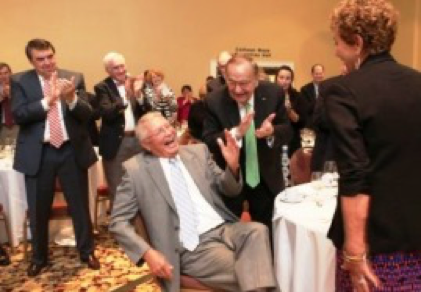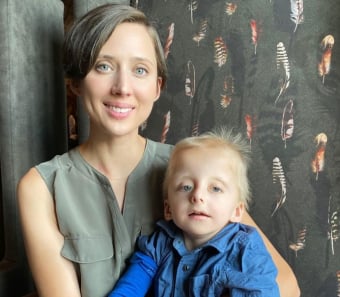
Faculty, board members and friends of the Greenwood Genetic Center (GGC) gathered Thursday evening at the Greenwood Federal Building to celebrate the Center’s four decades of providing genetic services for the people of South Carolina and contributions to the field of medical genetics.
The event began with a look back at the rich history of the organization. Founders, Dr. Roger Stevenson and Dr. Hal Taylor, paid homage to those instrumental from the initial development of the Center through its progression into a leader in genetics services known worldwide for expertise in the areas of intellectual disabilities, autism and birth defects.
The idea that became GGC began with Stevenson and Taylor during their fellowships at Johns Hopkins Hospital in the early 1970s. They dreamed of establishing a Center that provided compassionate care for patients and families while offering state-of-the-art technology.
In August 1974, the Self Family Foundation matched funds from the SC Department of Mental Retardation, now known as the SC Department of Disabilities and Special Needs (SC DDSN), to make it possible for GGC to begin operations. Frank Wideman of the Self Family Foundation, Dr. Beverly Buscemi, Director of SC DDSN, and SC Sen. Billy O’Dell offered their congratulations to the Center and their perspectives on what GGC has meant to Greenwood and to the state of SC.
Stevenson and Taylor’s work began in earnest in late 1974 with Stevenson heading up the clinical services and Taylor establishing the diagnostic laboratory. In the beginning, their staff consisted of four laboratory technologists, all of whom were in attendance at the celebration. Today GGC employs 170 individuals across SC.
“GGC is a unique organization created through the vision of Dr. Stevenson and Dr. Taylor focused on providing compassionate care to the families we serve and advancing the field through research and education,” shared Skinner. “However, without the early philanthropic support in 1974 from Jim Self, as well as the foresight of officials at the state level, those visions would have gone unfulfilled.”
“Forty years ago, we could have never imagined the prominence that the field of genetics would hold in modern medicine or the successes that we would achieve here in Greenwood,” said Stevenson. “GGC has played a major role in the development of the field in both clinical genetics and research and we owe that success to the talented faculty and dedicated friends who have supported our institution’s mission through the years.”
GGC’s Director, Dr. Steve Skinner, concluded the program with a look at the exciting future plans of the Center including the ongoing expansion into a center for genetic therapeutics, noting that the collaboration with Clemson University and partnerships with industry are “expanding our footprint, our resources and our reach.” He added, “Our goal is to continue to be at the forefront of utilizing new technology and knowledge that, when combined with compassion and caring, will convert our current hopes into the future realities of treatments, preventions, and even cures.”
The 40th anniversary celebration continued into Friday as the Center hosted the SC Genetics Conclave with a focus on the treatment of genetic disorders. The symposium included distinguished scientists from GGC and institutions across the US sharing their work in genetic therapeutics. Speakers visited from Brown University, University of Alabama at Birmingham, University of Texas, Emory University, and Lurie Children’s Hospital in Chicago.
Photo Caption: Dr. Roger Stevenson is recognized with a standing ovation during the event
